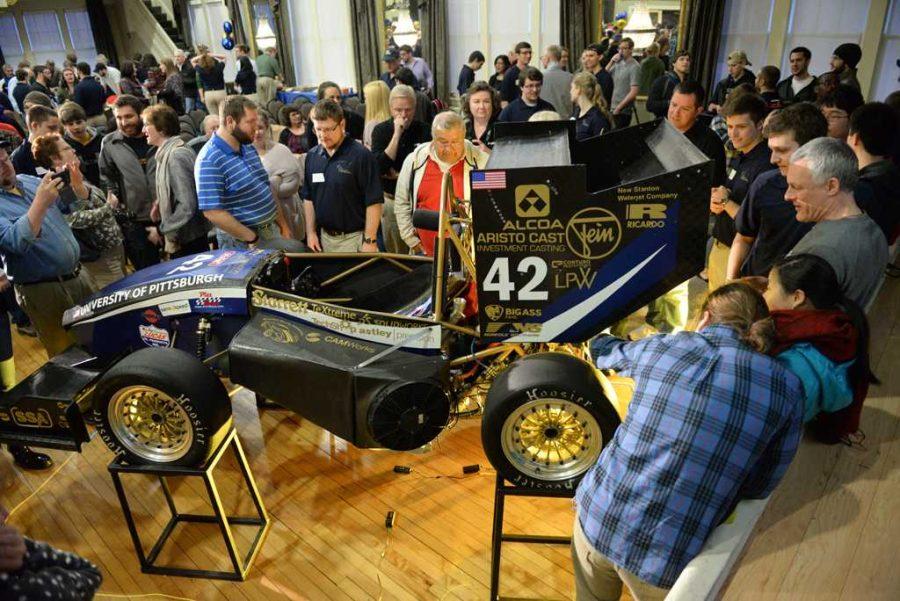‘To finish first, first you must finish’: Panther Racing pushes limits of performance, reliability
Attendees look at the PR-028 at a formula SAE showcase in 2016.
August 26, 2022
On any given day during the school year, several members of Pitt’s Formula SAE team, also known as Panther Racing, work deep into the night in the sub-basement of Benedum Hall. Away from their course load, they choose to spend their free hours tirelessly building and refining an open-wheeled race car that will compete in only a handful of events each year.
For the engineering students and motorsports enthusiasts who sometimes spend upward of 40 unpaid hours a week working on the car, they simply enjoy being able to work with free rein outside of the classroom. According to Lucas Ramsey, the club’s executive director and junior mechanical engineering major, FSAE isn’t just an extracurricular activity — it’s where he furthers his education with hands-on engineering experience.
“The classes kind of teach the theoretical part of it, but then the application is done in clubs,” Ramsey said. “It’s what has kept me coming back. I can learn all these concepts in classes, but for me to be able to go and apply them to a real thing helps so much with my level of understanding.”
Both Ramsay and senior electrical engineering major Joseph Szlavik voiced similar praises about how FSAE gives prospective engineers a chance to try every element that comes with building the car. Szlavik, who is the team’s technical director, said they are often forced to deal with situations in the workshop before they’re addressed in class.
“There’s plenty of times where I will learn stuff in the club before I learn it in the classroom,” Szlavik said. “There was a certain design problem we had where we had to design an analog circuit, and it was before I had taken any circuit design classes. I ended up researching and getting involved enough to where I could probably teach it better than I would in a class.”
While on the surface FSAE is a purely hands-on, engineering-based club, it wouldn’t survive without its business side of the team. Students who are interested in learning how to run a race team without getting their hands dirty can find an important role managing the program’s expenses and daily operations.
Former FSAE Business Director and Pitt graduate Lysia Gheris said the business team’s duties are far more high-stakes than just social media and running meetings — they manage the annual budget, which comes from the University and sponsors, allocating portions of the budget to each of the car’s several components.
“The biggest perpetual role of the job was the financial management and purchasing,” Gheris said. “We manage the budget that goes to everything, from travel and competition costs all the way to buying nuts and bolts and carbon fiber, everything you need to put the car together.”
Gheris said the business team constantly reaches out to sponsors and different departments at Pitt, keeping them informed on the car’s development and upgrades. Apart from donations, sponsorships are critical to the team’s success, as some businesses and organizations affiliated to the team provide workspaces, machinery or specialty parts that would otherwise be unattainable to the team.
On top of acquiring and distributing money to the team, there are also three business events at the annual end-of-year competition held at Michigan International Speedway. While they aren’t involved in optimizing the car’s performance, the business team can still acquire points for Pitt by acting as a manufacturer presenting their car to a panel of mock shareholders. According to Gheris, working the business side of the team both on a day-to-day basis and presenting at competition was invaluable to her practical education outside of the classroom.
“I always tell prospective students at recruitment events that I learned more in FSAE my freshman year than I did in the classroom of the business school all four years,” Gheris said. “For the competition events we were putting together financial reports that I didn’t learn even in high level finance courses … Learning how to navigate leadership and that kind of environment has been an extremely valuable experience.”
Once the budget is finalized and distributed, the engineering team takes over to produce a physical race car. The money is split between seven subsections, each equally important to the performance and reliability of the car. Incoming first years have the option to work on any of the seven components such as brakes or aerodynamics, often jumping from one to the other, exploring their interests.
Szlavik and Ramsay said when they first joined, they were able to work on all areas of the car, eventually finding a specific area of the car that they could specialize in. Each department has a learning curve, meaning it sometimes takes students years to develop a director-level understanding of a particular system.
For the engineering team, performance of the car when it comes to acceleration and handling is important — but what they really have to focus on is the reliability of the car. A 22-kilometer endurance event accounts for 30 percent of the teams’ points at events. Teams that sacrifice reliability for extra speed will often lose out on significant points in Michigan when a component malfunctions halfway through the distance event.
“The tradeoff with all these things is the reliability of different parts,” Ramsay said. “The reason why a lot of teams don’t get through endurance is because they’re trying to maximize all the points. All it takes is one little failure to crash your car.”
Last year at competition, Pitt managed to complete the endurance event for just the second time since 2017. For the engineers who worked endlessly on the car, prepping it for just a few moments of track time in Michigan, seeing their car cross the finish line was everything.
“It really felt amazing, I noticed a couple people cry,” Szlavik said. “I don’t think we slept for maybe four or five days straight preparing the car, it was pretty exhausting. But when we got to the competition and we finally saw the car run, it’s probably the most relieving thing in the world.”
After finishing no. 32 out of 100 teams in Michigan last May, Panther Racing is once again ready to start recruiting tenacious first years to help develop their 2023 challenger over the coming months. As regulations change and other teams get quicker, they will once again be asked to further push the limit of reliability and performance.
“One of the great things that has been mentioned to us by F1 engineers is that to finish first, first you must finish,” Szlavik said. “There’s no perfect balance between performance and reliability. I think that what I’ve learned and will keep with me throughout my engineering career is that finding that balance is more of an art than it is a science.”



